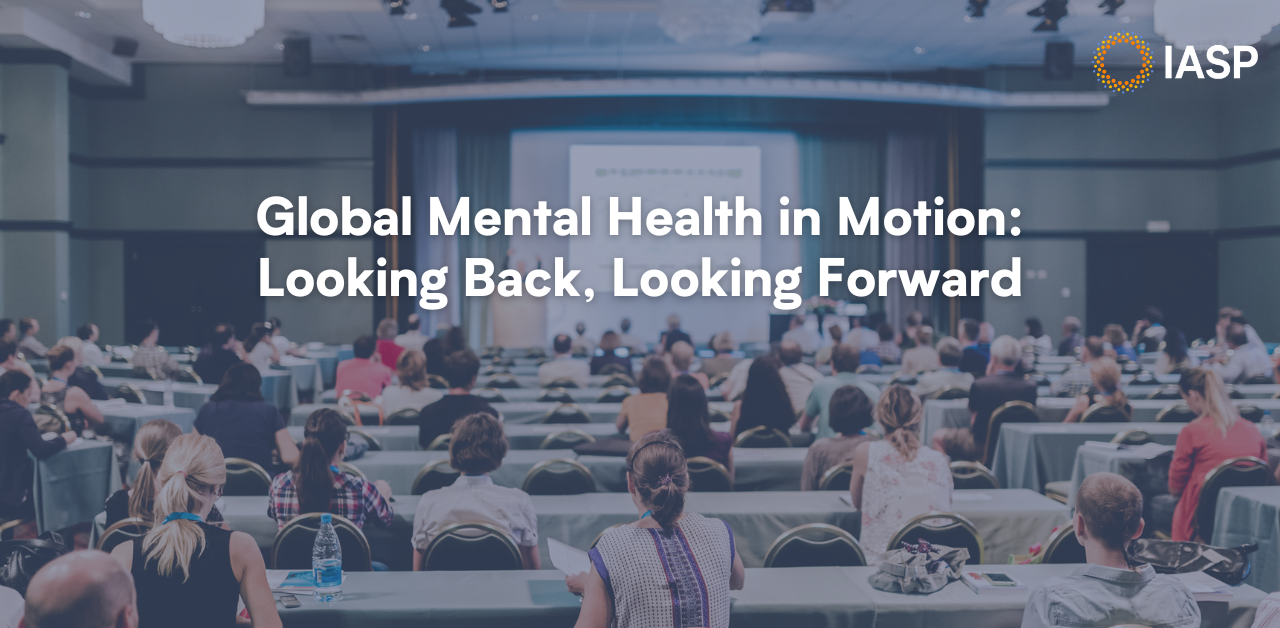The World Health Organisation (WHO) held its 2024 Mental Health Forum from October 9-10, marking the first in-person event since the COVID-19 pandemic. Bringing together over 30 member states, intergovernmental agencies, and non-state actors, the forum centred on the theme of integrating mental health, brain health, and substance use into the global health agenda. IASP, being in an official non-state actor relation with WHO, was pleased to engage in this world forum.
The two-day program agenda saw a combination of plenary sessions and breakout sessions, along with a meeting for non-state actors (NSAs), aimed to optimize the contributions of NSAs by sharing successful practices, addressing challenges, and fostering a deeper partnership in this specialized field. On the first day of the forum, WHO Director-General, Dr Tedros Adhanom Ghebreyesus’ opening remarks highlighted the global neglect of mental health, emphasising the urgent need for increased resources and action to overcome the stigma that hinders access to care.
Under the theme “Global Mental Health in Motion: Looking Back, Looking Forward,” the forum celebrated achievements such as WHO’s collaboration with UNICEF on child and adolescent mental health and launched The Lancet Psychiatry Commission on mental health in Ukraine. With a focus on mental health at work, WHO and the International Labour Organization introduced guidelines urging employers to prioritize workers’ mental well-being. The event also featured discussions on evolving practices in humanitarian settings, neurodiversity, and new frameworks for mental health policy.
Speakers from around the world, including Namibia, echoed concerns over the increasing mental health struggles among young people, often exacerbated by social pressures, parenting challenges, and academic stress. The forum underscored the urgent need for multi-sectoral collaboration, spanning health, education, and policy, to address these growing challenges in suicide prevention.
Suicide prevention took centre stage with discussions addressing policy, youth mental health, mental health and psychosocial support structures, the role of social media and digital environments in mental health, the challenges of regulating online activities like gambling, and the importance of data collection and monitoring in suicide prevention efforts. IASP played an active role in advocating for a dynamic, proactive approach that brings together various stakeholders in mental health and suicide prevention.
Professor Yasuyuki Shimizu, recipient of the IASP Ringel Service Award in 2023, spoke of the alarming rise in youth suicides globally, including specific insights from Japan, where there is renewed commitment to suicide prevention strategies following a concerning increase in child and youth suicides. Professor Shimizu highlighted the country’s comprehensive, whole-society approach, emphasising the need for stronger community collaboration and legislative frameworks. Despite significant progress in reducing overall suicide rates since 2006, suicides among children and young people remains a growing concern.
Discussions delved into risk factors such as loneliness, social media algorithms, and even gambling, which has been linked to rising suicide rates in countries like Switzerland and India. In Tamil Nadu, legislative measures to ban online gambling were shown to have a significant impact on reducing suicide rates, though legal challenges persist. This highlights the complex interplay between industry, legislation, and public health outcomes.
In addition, experts highlighted the significant differences in risk factors for suicide mortality between low and middle-income countries (LMICs) and high-income countries. In LMICs, social determinants such as poverty and inequality play a crucial role, while in high-income countries, mental health conditions are more prominent. This distinction is vital for shaping effective, targeted prevention strategies globally.
The Forum also provides an opportunity to hear collectively from the six WHO regional offices highlighting the breadth of potential within WHO and it’s collaborative partners to positively impact global suicide rates. IASP emphasised the importance of stronger, more interactive engagement with WHO Regional Offices, fostering a structured liaison to address diverse regional needs and facilitate better integration of suicide research and preventive strategies within the broader mental health landscape. The regions demonstrate a focus on strengthening leadership, improving service integration, enhancing data systems, and promoting multi-sectoral, evidence-based approaches to suicide prevention, tailored to the unique contexts and needs of each region.
A key challenge for many countries lies in the absence of nationally recognised data standards for tracking suicide rates and measuring the impact of related policies. There is ongoing effort to improve national data collection and reporting systems to better inform suicide prevention strategies. The conversation pointed out the difficulties in tracking certain mental health conditions due to the lack of specific coding, such as with problematic internet usage. This poses a challenge in linking specific behaviours, like excessive online activity, to mental health outcomes like suicidality. Ireland has taken an incremental approach to improving its data systems, particularly through the development of a self-harm register in emergency departments. Such initiatives allow for better service targeting, but the ongoing challenge is ensuring that policies are effectively reaching the right populations.
There was a strong call to focus on broader social determinants of suicide, beyond mental health. Issues like unemployment, access to food, and the well-being of marginalised groups (LGBTQ youth, children in migration) are critical, and addressing these factors requires a more comprehensive approach to suicide prevention. This discussion reflects the complexity of suicide prevention efforts and the importance of multi-faceted approaches that consider both individual mental health and broader societal factors.
This WHO Mental Health Forum provided a platform for collaboration and renewed action, underscoring that “there is no health without mental health.” Suicide prevention, a deeply intersectoral area of mental health, requires collaboration across various sectors. Forums like these are crucial to fostering open discussions and sharing best global practices and they help pave the way for a healthier future where mental well-being is accessible to all.




